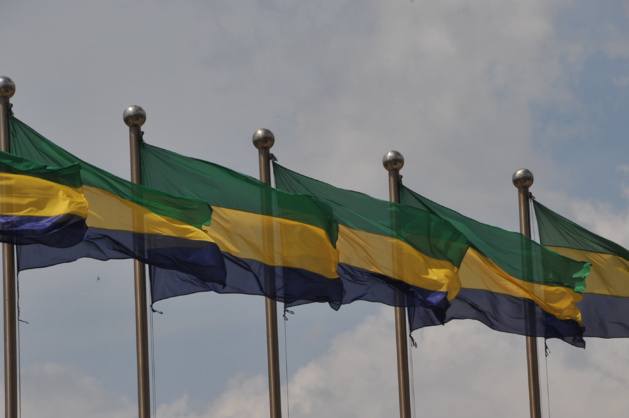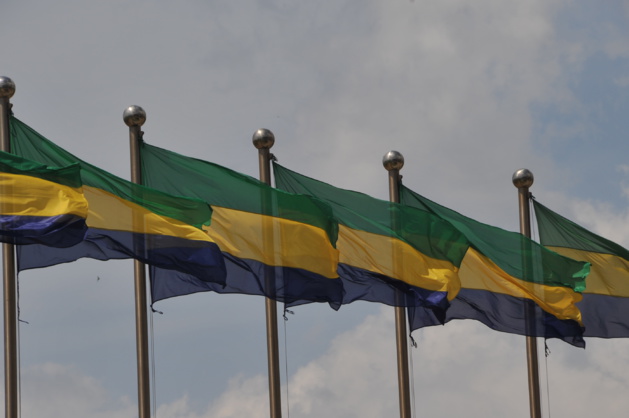
AFP/Célia Lebur
Ali Bongo, leader of the Gabonese Democratic Party, won the elections in 2009. Son of Omar Bongo, he took back the power held by his family since 1967. André Mba Obame, one of his opponents, former Minister of the Interior, finished in third place. In the face of this defeat that he could not understand, André Mba Obame began a hunger strike “in favour of democracy”.He had not envisaged defeat and thought that the election of Ali Bongo was impossible. His strike being of little use, he set about forming an opposition party, the National Union. In 2010, he brought the three biggest parties together: The Gabonese Union for Democracy and Development, The African Movement for Development and the National Assembly of Republicans. According to him, “it is the first time that the President of Gabon is faced with such a unified and determined coalition.”
January 25 2011, then Executive Secretary of the National Union, Mba Obame proclaimed himself President of the country and was sworn in as head of the party. He asked the UN to support him in sending a request of recognition to Ban Ki Moon. The international organisation rejected this demand and Mba Obame was arrested. The National Union was deemed complicit in his act by the government and was thus banned.
Burgeoning tensions and the affirmation of opposition.
The dissolution of the National Union for “disrespect of democratic principles, dangerous to the Republican form of the State, to national sovereignty and public order” sparked scepticism of many Gabonese. Some grouped together in the movement “Bongo Must Go” (BDP), denouncing the “arbitrary regime of the Bongo clan”. Several protests bore witness to the rising unpopularity of the President of Gabon. In December, a demonstration at Libreville cost three people their lives. These incidents were blamed on the forces of order by the opposition, who came across severely in their report: “In response to a peaceful protest, the head of State mobilized the special forces of the Gendarmerie and the police, and trained the weapons of the Republic on peaceful, unarmed Gabonese. The movement, having been accepted, was subsequently banned to avoid “threats to public order”.
Former associates of Omar bongo also joined the opposition. The Former Minister of Foreign Affairs, Jean Ping, during a show on France 4, labelled Ali Bongo an autocratic dictator.
The democratization of Gabon as a political strategy.
The restoration of the large opposition party as elections approach and with genuine tension developing in the country seems a move that is difficult to understand. Moreover, this restoration accompanies a softening of sanctions against the leading members or founders of a banned political party. For many Gabonese, this is explained away as a political strategy to suggest a democratic objective in the actions of the government.
In fact, Ali Bongo needs to reaffirm his legitimacy in the eyes of the people. The release of Pierre Péan’s book , New African Affairs, last October, called into question the legitimacy of His Excellency. In it, Pierre Péan exposed corruption, embezzlements of public funds, fixed elections etc. This book
, New African Affairs, last October, called into question the legitimacy of His Excellency. In it, Pierre Péan exposed corruption, embezzlements of public funds, fixed elections etc. This book also supports the claims made by André Mba Obame. According to the author, on the basis of the report by an autonomous and national electoral commission, victory for Ali bongo in 2009 was impossible. The winner ought to have been André Mba Obame. The book caused a scandal throughout the country, especially for questioning the lineage of Omar and Ali Bongo. The President would have been born in Nigeria, which would constitute an irregularity in the election.
also supports the claims made by André Mba Obame. According to the author, on the basis of the report by an autonomous and national electoral commission, victory for Ali bongo in 2009 was impossible. The winner ought to have been André Mba Obame. The book caused a scandal throughout the country, especially for questioning the lineage of Omar and Ali Bongo. The President would have been born in Nigeria, which would constitute an irregularity in the election.
 , New African Affairs, last October, called into question the legitimacy of His Excellency. In it, Pierre Péan exposed corruption, embezzlements of public funds, fixed elections etc. This book
, New African Affairs, last October, called into question the legitimacy of His Excellency. In it, Pierre Péan exposed corruption, embezzlements of public funds, fixed elections etc. This book also supports the claims made by André Mba Obame. According to the author, on the basis of the report by an autonomous and national electoral commission, victory for Ali bongo in 2009 was impossible. The winner ought to have been André Mba Obame. The book caused a scandal throughout the country, especially for questioning the lineage of Omar and Ali Bongo. The President would have been born in Nigeria, which would constitute an irregularity in the election.
also supports the claims made by André Mba Obame. According to the author, on the basis of the report by an autonomous and national electoral commission, victory for Ali bongo in 2009 was impossible. The winner ought to have been André Mba Obame. The book caused a scandal throughout the country, especially for questioning the lineage of Omar and Ali Bongo. The President would have been born in Nigeria, which would constitute an irregularity in the election.
The President’s decision to restore the National Union therefore gives a slight sense of democracy to the government and its actions. For the growing movements for Democracy and Development of the country, this decision was a necessity.
Two years remain for the National Union to attempt to find someone who will appear and represent ten or so political parties.André Mba Obame returning is itself very uncertain. The Founder of the Union has had terrible health problems. He is now at a home in Niamey where he is exiled.




























